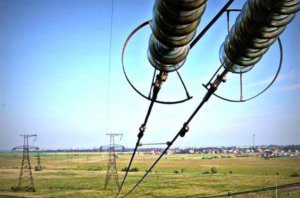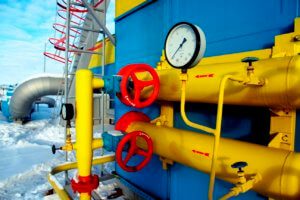
National energy company Ukrenergo believes that in the conditions of rampant development of renewable energy, highly maneuverable balancing facilities (battery and gas reciprocating power plants) with a capacity of 2.5 GW should be built in Ukraine before 2025, Ukrenergo Head Vsevolod Kovalchuk said at the presentation of the respective study in Kyiv on Tuesday.
“Quick maneuverable balancing facilities should cover 30% of the installed capacity of facilities using renewable energy. Based on the forecasts of how the total capacity of solar power plants and wind farms will increase, by 2025 we need to build maneuverable facilities with a capacity of 2.5 GW – energy storage facilities with lithium batteries and gas reciprocating plants,” he said.
Kovalchuk said that the cost of building these facilities is about UAH 55 billion.
The head of Ukrenergo said that if Ukraine does not build highly maneuverable facilities, then with an increase in the share of renewable energy, it will have to limit production of nuclear power plants (operating in the basic mode) and increase the share of coal-burning thermal power plants (TTPs capable of maneuvering). This will raise the total cost of electricity generated in the country by 57.7%.
Another alternative scenario is to limit the operation of solar power plants and wind farms in the peak periods. This will cost the country even more, as it will have to pay for both operation of nuclear power plants and TPPs, as well as compensate for under-generated electricity of solar power plants and wind farms. In this scenario, the total cost of electricity generated in the country will increase by 99%.
“Out of the three possible scenarios, the construction of highly maneuverable balancing facilities leads to the least increase in the cost of electricity – by 48.7%. The investment of UAH 55 billion in their construction will save UAH 65 billion in comparison with the scenario of limiting the operation of renewable energy,” the head of Ukrenergo said.
The head of the company said that, in his opinion, the construction of energy storage facilities with lithium batteries should be stimulated either by introducing a special tariff (following the example of ‘green’ energy) or through the mechanism of auctions.
“We will initiate the introduction of a feed-in tariff, or other mechanisms that would make it possible to make the profitability of these highly maneuverable facilities no lower than for facilities consuming renewable energy,” Kovalchuk said.
The head of the company said that a pilot project can be organized through Ukrenergo, when the Ukrainian power grid operator itself holds an auction for the construction of energy storage facilities.
At the same time, he said that it would be impossible to delay the solution of the problem. The first 500 MW of highly maneuverable facilities should begin to operate in 2020.

Ukraine in January-March 2018 reduced natural gas imports by 56.5% (by 2.404 billion cubic meters) compared to the same period in 2017, to 1.819 billion cubic meters, according to data from PJSC Ukrtransgaz. According to calculations made by Interfax-Ukraine, in particular 1.248 billion cubic meters were received from Slovakia in January-March 2018 (65.7% less compared to January-March 2017), 339.7 million cubic meters from Hungary (37% up), and 231.1 million cubic meters from Poland (31.3% down).
Imports in March 2018 amounted to 673.9 million cubic meters of gas, which is 52.4% less than in March 2017 (1.403 billion cubic meters).
At the same time, Ukraine has not imported natural gas under the contract with Gazprom for more than two years (since November 26, 2015), purchasing it exclusively on its western border.
Ukrtransgaz, 100% owned by Naftogaz Ukrainy, operates a system of trunk gas pipelines and 12 underground gas storage facilities in the country.

Ukrainian President Petro Poroshenko has signed a bill deregulating the license issue in the oil and gas production sphere.
According to a posting on the website of the Verkhovna Rada, the signed document was returned to the parliament on March 29.
The law permits the use of the servitude tool for the construction of oil and gas production facilities and pipelines (without changing the purpose of land use).
In addition, the need to obtain a patented mining claim is eliminated. Oil and gas production facilities are removed from the list of facilities of town-planning activity. The obligatory introduction of deposits to research, industrial and commercial development is canceled by the decision of the Ministry of Energy and Coal Industry.
The document gives the right to oil and gas producers after the completion of the period of research and industrial development of deposits to use land parcels on the basis of an agreement with the owner of the land parcels until the purpose of land use is changed and documents for the right to use land are registered (now companies are obliged to stop production for the period of processing documents).
The removal and transfer of soil for further drilling can be carried out without special permission on the basis of a detailed land management project.
The law grants deposit users the right to use their geological information without agreeing them with authorities. In addition, it is proposed to expand the range of entities that can conduct a geological and economic assessment of oil and gas reserves (now this right is owned exclusively by the State Commission of Ukraine for Mineral Reserves).
As reported, the Verkhovna Rada adopted on March 1 at the second reading and in general bill No. 3096-d, which deregulates the license issue in the oil and gas production sphere.

JKX Oil&Gas Plc with assets in Ukraine saw a 52.3% fall in net loss in 2017, to $17.7 million. According to an annual report of the company posted on the website of the London Stock Exchange (LSE), revenue last year grew by 3.5%, to $76.4 million, and operating profit stood at $7.8 million compared with $3.9 million of loss a year ago.
In 2017 group average production was 8,658 barrels of oil equivalent per day (boepd, 14.1% down year-over-year).
Production in Ukraine fell by 12%. Gas production fell by 10%, to 16.7 million cubic feet per day (MMcfd). Oil and gas condensate output decreased 20%, to 719 boepd.
As reported, in Ukraine JKX owns Poltava Petroleum Company.
The largest shareholders of JKX are Eclairs Group of Ihor Kolomoisky and Hennadiy Boholiubov with 27.47% of the shares, Keyhall Holding with 11.42% of the shares, Neptune Invest & Finance Corp with 12.95%, and Russia’s Proxima Capital Group with 19.92% and Interneft Ltd. with 6.6%.